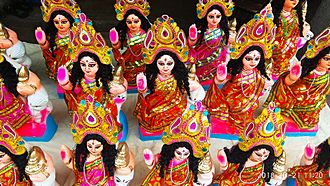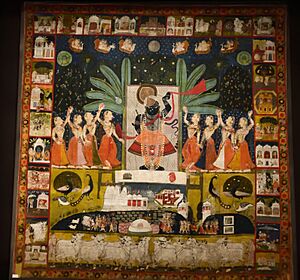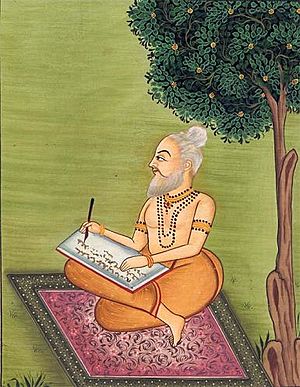Sharad Purnima facts for kids
Quick facts for kids Sharad Purnima |
|
|---|---|

Idols of Kojagori Laxmi, an avatar of goddess Laxmi worshipped on this day
|
|
| Also called | Kumara Purnima, Kojagari Purnima, Navanna Purnima, Kojagrat Purnima or Kaumudi Purnima |
| Observed by | Hindus |
| Type | Hindu |
| Celebrations | Worshipping, offering flowers and dishes to deities, dancing |
| Date | Ashwin māsa Purnima tithi |
| Frequency | Annual |
Sharad Purnima is a special Hindu festival. It is also known by other names like Kumara Purnima, Kojagari Purnima, Navanna Purnima, Kojagrat Purnima or Kaumudi Purnima. This festival happens on the night of the full moon in the Hindu month of Ashvin. This is usually in September or October. It marks the end of the monsoon rainy season. People celebrate this full moon night in different ways across South Asia.
On this important day, many divine pairs are worshipped. These include Radha Krishna, Shiva Parvati, and Lakshmi Narayan. People also worship the Moon. They offer flowers and a sweet dish called kheer (made from rice and milk). Statues of gods and goddesses in temples often wear white clothes. This shows the bright light of the moon. Many people also fast all day on this night.
Contents
What is the Meaning of Sharad Purnima?
Kojagari Purnima is about following a tradition called the Kojagara Vrata. People do this Vrata under the moonlight. They fast during the day and then perform rituals at night.
Lakshmi, the Hindu Goddess of Wealth, is very important on this day. Many believe it is her birthday. Lord Indra, who is the God of Rains, is also worshipped. His elephant, Airavata, is honored too.
It is believed that on Sharad Purnima night, Radha Krishna and their friends, the Gopis, perform a special dance called the raas. Lord Shiva is said to join this divine dance. Old Hindu texts like the Brahma Purana and Skanda Purana describe this night. People also believe that Goddess Lakshmi comes down to Earth on this full moon night. She watches what people are doing.
How is Sharad Purnima Celebrated?
People celebrate Sharad Purnima in different ways. These celebrations happen in various parts of India, Bangladesh, and Nepal.
Celebrations in India
In Bengal and Assam, this night is called Kojagari Purnima. 'Kojagari' means 'who is awake' in Bengali. People believe that Goddess Laxmi visits homes on this night. She checks if people are awake. If they are, she blesses them.
In many parts of Gujarat, people perform the garba dance. They dance under the bright moonlight.

In northern and central states like Uttar Pradesh and Bihar, kheer is made. This sweet dish is kept outside under the moonlight all night. The next day, people eat the kheer as a special offering called prasad. It is believed that on this night, amrit (a divine drink) drips from the Moon into the kheer. Goddess Laxmi is also worshipped on this night.
In the Mithila region of Bihar, there is a special celebration. It happens at the home of a newly married groom. The groom's family shares betel leaves and Makhana (fox nuts). These are gifts from the bride's family. They give them to their relatives and neighbors.
In Odisha, unmarried women fast on this day. They believe it will help them find a good husband (kumara). These young women worship the moon. The worship starts early in the morning when the moon sets. They wear new clothes. They use a kula (a basket made of bamboo strips). The kula is filled with rice puffs, sugarcane, betel leaves, betel nuts, and seven different fruits. In the evening, they worship the full moon again. They break their fast by eating a dish made from fried paddy, fruits, curd, and jaggery. They offer this to the moon god near the 'tulsi' plant. After this, the young women play games and sing songs under the full moon.
Celebrations in Nepal
In Nepal, this day is known as Kojagrat Purnima. It is the last day of the 15-day Dashain festival. 'Kojagrat' means 'who is awake' in Nepali. Like in eastern India, Nepalese Hindus stay awake all night. They show respect to Goddess Laxmi. It is also the last day to get the Dashain tika from family members.
Valmiki Jayanti
The birthday of Valmiki is also celebrated on this day. Valmiki was a famous poet who wrote the Hindu epic Ramayana. This day is also called Valmiki Jayanti and Pragat Diwas. People remember the great poet and writer on this day.
 | Delilah Pierce |
 | Gordon Parks |
 | Augusta Savage |
 | Charles Ethan Porter |



